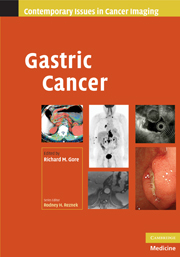Book contents
- Frontmatter
- Contents
- List of contributors
- Series Foreword
- Preface to Gastric Cancer
- 1 Epidemiology of gastric cancer
- 2 Pathology of gastric cancer
- 3 Endoscopy in the diagnosis and treatment of gastric cancer
- 4 Upper gastrointestinal series in the diagnosis of gastric cancer
- 5 Surgical management of gastric cancer
- 6 Systemic therapy for gastric cancer
- 7 MDCT, EUS, PET/CT, and MRI in the management of patients with gastric neoplasms
- 8 Gastric cancer: current trends and future opportunities
- Index
Preface to Gastric Cancer
Published online by Cambridge University Press: 31 March 2010
- Frontmatter
- Contents
- List of contributors
- Series Foreword
- Preface to Gastric Cancer
- 1 Epidemiology of gastric cancer
- 2 Pathology of gastric cancer
- 3 Endoscopy in the diagnosis and treatment of gastric cancer
- 4 Upper gastrointestinal series in the diagnosis of gastric cancer
- 5 Surgical management of gastric cancer
- 6 Systemic therapy for gastric cancer
- 7 MDCT, EUS, PET/CT, and MRI in the management of patients with gastric neoplasms
- 8 Gastric cancer: current trends and future opportunities
- Index
Summary
Gastric adenocarcinoma is the second most common cancer in the world. Nearly one million new cases of this tumor develop annually and well over 700 000 individuals die from this neoplasm each year. In Asia, gastric cancer accounts for 31% of all cancer incidence cases in men and for 22% in women. Because of aggressive screening programs, gastric cancer is often found at an earlier, potentially curable stage in Asia. In the West, this tumor is usually diagnosed in its later stages and the prognosis is grim. Indeed, even with modern diagnostic and treatment methods, only 10% of patients in the West are alive within five years of diagnosis.
Improvements in overall survival of patients with gastric cancer can only be achieved by earlier diagnosis and by tailored therapeutic strategies that are based on histologic tumor type, tumor location, tumor stage at the time of presentation, and the physiologic status of the patient. The purpose of this book is to provide a state of the art, integrated diagnostic and therapeutic approach to patients with this lethal neoplasm. The role of the upper gastrointestinal series, endoscopy, endoscopic ultrasound, multidetector computed tomography (CT), magnetic resonance imaging, and positron emission tomography//CT in the diagnosis, treatment, staging, and follow-up of patients with gastric cancer is emphasized. The relative strengths and weaknesses of these diagnostic examinations will be presented in context with the most recent epidemiologic, pathologic, and therapeutic concepts regarding this tumor.
- Type
- Chapter
- Information
- Gastric Cancer , pp. ix - xPublisher: Cambridge University PressPrint publication year: 2009



